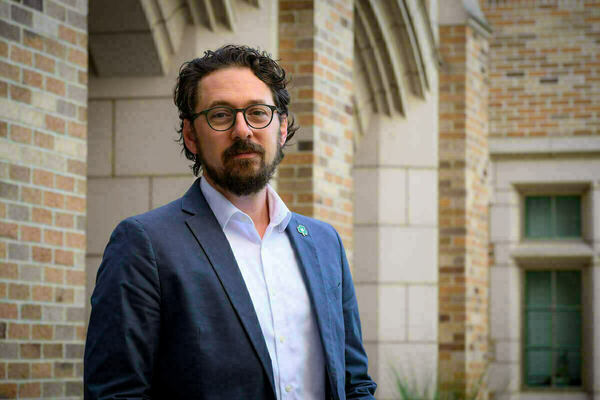The health of the planet has consequences for human health, stresses commentary in The Lancet
A decade after the Rockefeller Foundation–Lancet Commission on Planetary Health first urged humanity to consider the health consequences of a changing planet, 16 scientists, including one from the University of Notre Dame, reiterate that call in an article in The Lancet published in July 2025.
The authors, experts from across the globe, emphasize that the destabilization of Earth's life-support systems, which include climate change, biodiversity loss, and pollution, threatens human health.
“We need to be looking at virtually everything we do on this planet through a planetary health lens,” said co-author Jason Rohr, the Ludmilla F., Stephen J., and Robert T. Galla College Professor & Department Chair of the University of Notre Dame’s Department of Biological Sciences. “What we do to the environment affects our health; the two are intricately linked.”
Rohr contributed his knowledge of infectious diseases that rise from different types and levels of environmental change. The writers provided four recommendations.
-
Closer collaboration between members of the planetary boundaries community — people who study and understand the limits for how much humans can affect the Earth without causing damage — and the human health communities. Changes to climate, freshwater availability, land use, and other key Earth system processes are linked to numerous health outcomes, from infectious diseases to malnutrition to mental illness.
-
Climate change and ecological harm disproportionately affect vulnerable populations who have contributed least to the problem, including future generations, indigenous communities, and low-income regions. Efforts to stabilize natural life-support systems across the globe need to be evaluated to ensure that the burdens and benefits are fairly distributed.
-
Economic decisions too often ignore the real costs of environmental damage and the health benefits of a thriving planet. The scientists suggest a new model of accounting that fully internalizes the human health costs of environmental change because of human activity. The model should also recognize the health benefits of actions like clean energy, nature preservation, and sustainable food systems.
-
The final suggestion stresses the need for better public understanding and communication of how environmental and health systems are linked. The authors suggest broadening scientific literacy and providing engaging storytelling in several different forms.
In addition to Rohr, the 15 other authors include Johan Rockström, who developed the planetary boundaries framework and played a significant role in the foundation of the Frontiers Planet Prize. Rockström is professor in water systems and Global Sustainability at Stockholm University, joint director of the Potsdam Institute for Climate Impact Research in Germany, and chief scientist at Conservation International. Lead author Samuel S. Myers is a professor of environmental health and engineering at Johns Hopkins University and is the founding director of the Planetary Health Alliance.
Originally published by at science.nd.edu on August 06, 2025.
Latest Research
- ND research teams awarded funding to address sustainability challenges around the worldNotre Dame's Just Transformations to Sustainability Initiative has awarded funding to three cross-disciplinary faculty teams leading research on pressing sustainability issues—including forest conservation in the Amazon, watershed…
- Fighting to improve hurricane forecastsResearchers at Notre Dame are improving hurricane forecast accuracy, giving officials time to evacuate and protect residents. Read the article
- 2025 Naughton Fellowships awarded to four joint faculty projectsThe University of Notre Dame’s Naughton Fellowship program has announced its faculty awardees for the 2025-2026 cohort. Faculty from leading Irish universities and Notre Dame have come together to work on four research projects as a part of the Naughton Faculty…
- Notre Dame Law School Welcomes Four New Clinical Faculty Members for 2025–26Notre Dame Law School is pleased to welcome four new clinical faculty members for the 2025–26 academic year. “It is an honor to welcome such a distinguished group of clinical professors to Notre Dame Law School. Their impressive achievements and deep sense of vocation will enrich our academic…
- Six early-career scholars join the inaugural Provost’s Postdoctoral Fellowship Program.Six interdisciplinary scholars have joined the College of Arts & Letters at the University of Notre Dame to continue their research, obtain invaluable support, and engage in professional development as part of the inaugural Provost’s…
- Politics inspired Democracy Initiative managing director from early ageThis is the first in a series of features highlighting the managing directors of the University's strategic initiatives. The managing directors are key (senior) staff members who work directly with the faculty directors to help implement and operationalize the vision for the initiatives, oversee initiative staff, and serve as thought partners for the faculty directors.











